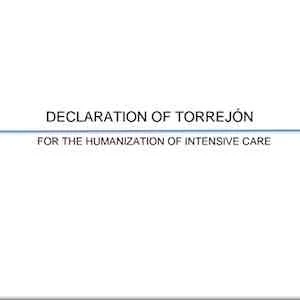The movement to humanise intensive care has taken a step forward with the publication of the Declaration of Torrejón for the Humanization of Intensive Care on 6 May. The document was drawn up by several health care professionals, patients and families to declare their commitment to the humanisation of Intensive Care Units.
The declaration, which is available online for supporters to sign, states the belief “that a change is needed in order to improve the communication and collaboration between Intensive Care health personnel and the critically ill…we must not forget the interpersonal aspects of comfort care and reassurance that must be provided to patients and their families during situations of extreme duress.”
The declaration presents obligations and rights for ICU professionals, patients and their families.
The Declaration will be read publicly during the National Conference on Humanization, May 27th and 28th, in Torrejón (Madrid, Spain).
The declaration, which is available online for supporters to sign, states the belief “that a change is needed in order to improve the communication and collaboration between Intensive Care health personnel and the critically ill…we must not forget the interpersonal aspects of comfort care and reassurance that must be provided to patients and their families during situations of extreme duress.”
The declaration presents obligations and rights for ICU professionals, patients and their families.
- ICU personnel must provide excellent clinical care, effective technological support, and honest, open communication with the patients and their families.
- ICU patients have the right to comprehensive treatment, both medically as well as psychologically in an atmosphere of honest communication and a caring bedside manner.
- ICUs should provide work environments that reduce stress, ensure safety, foster teamwork, thus working together to improve the care of patients and their families while reducing professional burn-out.
- Facilitate communication among patients, family members, and the care team.
- Facilitate and provide the most appropriate information for the patients and their families.
- Make visiting hours more flexible for family members.
- Encourage the participation of family members in the care of the patient and in the decision-making process.
- Measure patient/family member satisfaction and act on the results.
- Humanize end-of-life care for the dying and for their families.
- Promote structural and architectural improvements in the design of the ICU.
- Prevent the deterioration of the workplace environment, thus combating professional dissatisfaction, discouragement, and perceived stress factors.
- Provide adequate emotional support for ICU staff in crisis situations.
- Resolve potential bioethical conflicts.
- Offer specific training for ICU personnel: coping with death, dealing with stressful situations, managing families through the dying process, etc.
- Continue researching to increase the empirical evidence available.
The Declaration will be read publicly during the National Conference on Humanization, May 27th and 28th, in Torrejón (Madrid, Spain).
Latest Articles
intensive care, ICU, patients, families
Declaration of obligations and rights for humanising intensive care










